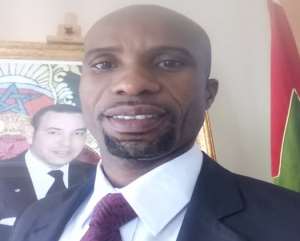
Friday, June 24, 2022 Nador-Melilla tragedy caused by the unfortunate aggressive attempt by hundreds of illegal migrants to cross the iron fence separating Nador city in northern Morocco and Melilla should be a wake-up call for the world, especially African leaders. As we mourn the unfortunate death of the 23 migrants and condemn the extreme violence of the migrants and their assault strategy which led to the unfortunate incident, we must also appropriately applaud the high sense of mastery and professionalism demonstrated by the Moroccan police officers. Indeed, Morocco has always put the human element at the heart of its priorities. The tactful conduct of the officers on duty further confirms Morocco’s social conscience and awareness of this noble national priority.
Obviously, the African failure to deal with the illegal migration issues at the continental level is responsible for the Melilla tragedy, of which Morocco is a victim. Africa is constantly referred to as a continent that is “rising.” However, not every person is “rising” in the morning with the strength of the continent’s roaring economies. We have the resources to feed every man, woman and child in Africa, while also feeding people in global markets. Yet, while the continent has almost half of the world’s fertile land, Africa spends billions on annual food imports. Morocco has forged a unique, authentic and tangible South-South cooperation model which has made it possible not only to consolidate cooperation in the traditional areas of training and technical assistance but also to engage in new, strategic sectors such as food security and infrastructure development. Morocco always offers concrete solutions to African issues and pragmatic strategies for African aspirations.
It is worth mentioning that, Morocco where I lived and studied with hundreds of migrants from sub-Saharan countries fully assumes its responsibilities when it comes to preserving the dignity of migrants, especially those from neighbourly Africa countries.
The conditions of migrants in any country are subjective to immigration policies, sociopolitical conditions of the state and the status of illegality given to them. Though Morocco serves as a buffer state for migrants from sub-Saharan countries attempting to enter Europe, the North African country has given migrants enough reasons to stay in Morocco, while also responsibly making it harder for them to get onto European soil. The Kingdom has put in place measures for immigration whereby migrants are better integrated in the Moroccan society. Morocco’s migration policy plan offers equal opportunities for the migrants and improved access to economic, cultural and political rights changing the perception of migration in Moroccan society.
The interest of the Kingdom in migration is “neither recent nor incidental. It reflects a longstanding, voluntary commitment expressed through a policy which is humane in its philosophy, global in its substance, pragmatic in its methodology and responsible in its approach. Undeniably, Morocco has always been a home for many migrants and offers the prospect of a better life for many thanks to the solidarity, hospitality and generosity of the Moroccan people. It welcomes over 10,000 students from 42 African countries, including students with Moroccan scholarships. This cultural cooperation covers as well the Pacific Island countries that benefit annually Moroccan scholarships. It has indeed allowed hundreds of thousands of African migrants to settle in the kingdom legally, with a job, housing, education for their children and a peaceful family life. Morocco’s migration policy is driven by empathy, imbued with fraternity and nurtured by compassion. Even though the economic cost of this migration policy is high, its value and impact on the immigrants is immeasurable.
Morocco’s vision regarding migration issues consists in anticipating the future to build orderly mobility. The Kingdom’s approach consists in invariably seeking to strike a beneficial balance between realism and proactive action between the legitimate interests of States and respect for the human rights of migrants. Since, no single country can, on its own, face up to such a challenge, all Africans must work together to tackle the root causes of risky migration and offer meaningful solutions to the migration issues. Our common interest as Africans lies in working towards the adoption of pertinent, tailored responses so that our young people may realize that their future is in Africa and for Africa. Just as there is no alternative to cooperation, there is no alternative to action, either. Africa must act, and we must act now!
PETER PANYIN ANAMAN
PRESIDENT- GHANA MOROCCO OLD STUDENTS ASSOCIATION




 We’ll protect state wealth from opaque deals – Prof Jane Naana
We’ll protect state wealth from opaque deals – Prof Jane Naana
 Mauritania president says running for second term in June polls
Mauritania president says running for second term in June polls
 I won't ever say I was a mere driver’s mate' — Prof. Opoku-Agyemang
I won't ever say I was a mere driver’s mate' — Prof. Opoku-Agyemang
 2024 polls: 'EC struggling to defend credibility'— Prof. Opoku-Agyemang
2024 polls: 'EC struggling to defend credibility'— Prof. Opoku-Agyemang
 Akufo-Addo gov't's 'greed, unbridled arrogance, unrestrained impunity, sheer dis...
Akufo-Addo gov't's 'greed, unbridled arrogance, unrestrained impunity, sheer dis...
 Election 2024: Ghana needs an urgent reset, a leadership that is inspiring – Ma...
Election 2024: Ghana needs an urgent reset, a leadership that is inspiring – Ma...
 Partner NDC to rollout a future of limitless prospects – Prof Jane Naana Opoku-A...
Partner NDC to rollout a future of limitless prospects – Prof Jane Naana Opoku-A...
 NPP will remain in gov’t till Jesus comes — Diana Asamoah
NPP will remain in gov’t till Jesus comes — Diana Asamoah
 Sunyani Technical University demands apology from former SRC president over sex-...
Sunyani Technical University demands apology from former SRC president over sex-...
 'Dumsor' was resolved by Mahama but ‘incompetent' Akufo-Addo has destroyed the g...
'Dumsor' was resolved by Mahama but ‘incompetent' Akufo-Addo has destroyed the g...
